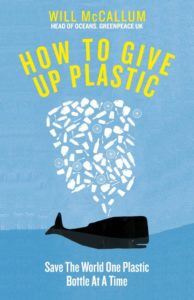 Our oceans are filled with plastic garbage causing huge damage to our marine life.
Our oceans are filled with plastic garbage causing huge damage to our marine life.
A Greenpeace NZ campaign “Ban the bag” found that 1/3 of the turtles found dead on our beaches had swallowed plastic – most often in the form of single-use bags. The figure was about the same for dead seabirds.
Worldwide around 12.7 million tonnes of plastic are entering the ocean every year, killing over 1 million seabirds and 100,000 marine mammals. By 2050 there could be more plastic in the ocean than fish by weight.
Faced with an environmental problem of such magnitude, we can feel totally overwhelmed. But there are ways we can help.
In How to Give up Plastic. A Guide to Changing the World, One Plastic Bottle at a Time, Will McCallum, the Head of Oceans at Greenpeace and spokesman for their anti-plastic campaign has good advice on how we can reduce our plastic footprint.
- Stop using plastic bags, plastic drinking bottles and plastic straws
These three items alone account for a great deal of the plastic rubbish which is polluting our oceans
- Reduce Plastic at Home. Make an inventory of all the plastic items you can find in each room and then think of a way that you can use less of them or replace them. Some you may not have been aware of e.g. it’s not commonly known that wet wipes are often made using plastic fibres.
Or you may be unaware that there are available substitutes. For instance, there is a bar which you can use instead of shampoo in a plastic dispenser. These I have yet to see in our supermarkets but you can order them online.
But before you start on this journey his top tip is:
“Don’t try to do it all at once or it will be like all those New Year’s resolutions which were quickly broken.”
Reduce plastic in your workplace:
A starting point is to take stock of all the throwaway plastic being used there.
The best way to persuade your colleagues to reduce the amount of plastic at work is to be positive, encourage rather than criticise.
Work together:
The finger is often pointed at the individual consumer but it is the companies who produce the bags, containers and packaging that are most at fault. As well as the governments who are failing to pass the laws to stop them.
A communal effort is needed to turn this around says Will McCallum. Many voices can be a very powerful influence to persuade them to change.
Write or email letters to politicians or your local newspaper, join action groups, and making your views known to local businesses and large companies.
While it is great that companies, including some of our main supermarkets, are phasing out single-use plastic bags and this is a step in the right direction, much more needs to be done!
That was brought home to me the other day when I took a reusable bag to the supermarket. When I unpacked the groceries, the fruit and vegetables were in plastic bags, the milk and oil in plastic containers and the yoghurt in a plastic tub.
More than 30 countries have levies on or have already banned single-use plastic bags. It’s disappointing that New Zealand is lagging behind despite the fact that 65,000 kiwis signed a petition which was presented to our Conservation Minister urging a regulatory ban on plastic bags.
I found How to Give up Plastic. A Guide to Changing the World, One Plastic Bottle at a Time easy to read, full of facts and useful ideas. It’s the kind of book you could easily share with your family and make plans together to reduce your plastic footprint.
You could also join in Plastic Free July (an annual worldwide campaign spread over 30 countries) to stop using single-use plastic.) http://www.plasticfreejuly.org/
Their vision is to encourage people to be more aware of their plastic use, so creating a cleaner world for generations to come, a world without plastic waste.
You don’t have to be perfect to join in and it is up to you as to how long you go plastic free, a day, a week, a month or longer. However long you choose it all helps!
Title: How to Give up Plastic. A Guide to Changing the World, One Plastic Bottle at a time. Author: Will McCallum. Published by Penguin. RRP: $32









Join the Discussion
Type out your comment here:
You must be logged in to post a comment.